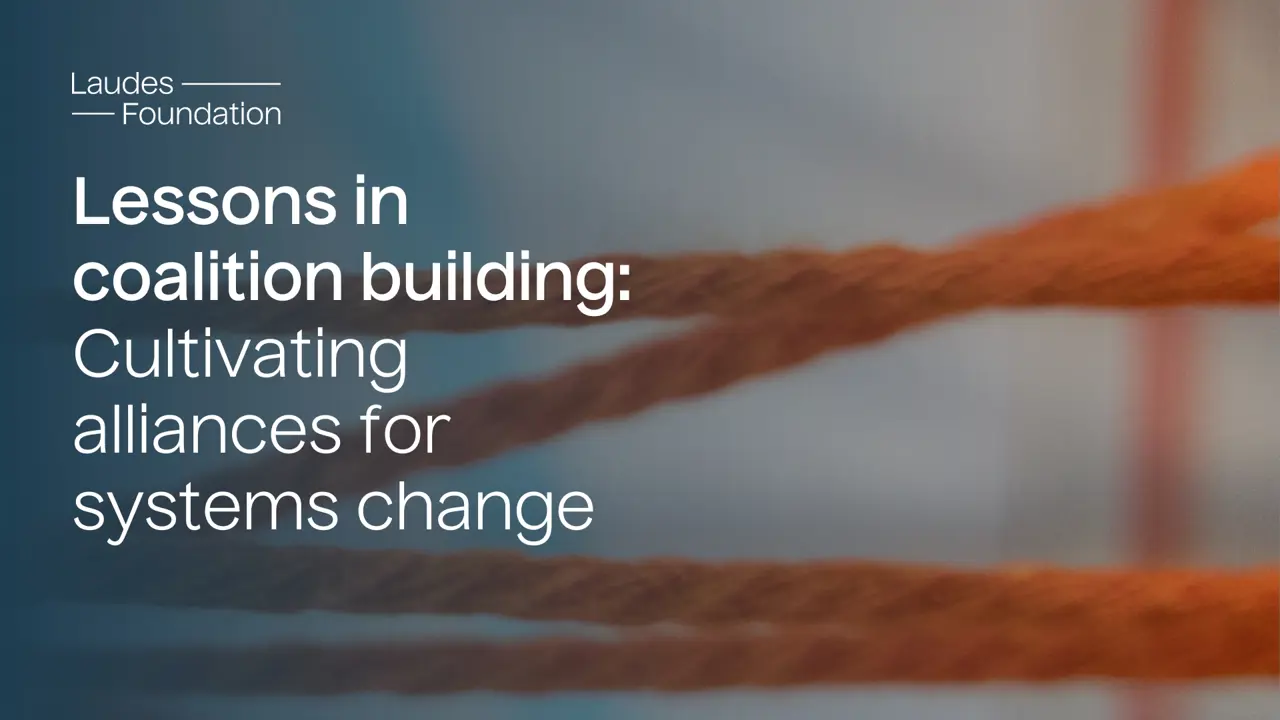Cultivating alliances for systems change

Transforming an industry, whether in fashion, the built environment, or finance, requires far more than innovative ideas. It calls for coalitions grounded in local realities, strengthened by diverse perspectives, and united around a shared purpose. Over the years, we have had the privilege to support and learn from coalitions that are doing just that.
This work has reminded us time and again that real progress is made when trust is built, leadership is shared, and partnerships are rooted in jointly understanding the context of the industries we want to help transition.
Why coalitions matter
We know that industry transitions are too complex and interdependent to be solved by individual actors. At Laudes Foundation, cultivating alliances is one of six approaches that guide our Theory of Change. It involves convening partners, coalitions, networks, and movements towards collaboration on the industry transformation work that is core to our mission.
Here are some of our lessons in joining, and often leading these collaborative efforts:
1. Start local and engage deeply
One of the clearest lessons from this work is that lasting change starts close to the ground. It begins with those who live the reality of the systems we aim to transform.
In the fashion sector, for instance, the Regenerative Production Landscape Collaboratives (RPLC) have shown the power of grounding action in local knowledge. For example, farmers in the RPLC in India have been able to work to develop a land management system in line with regenerative practices that has now led to increased incomes, better soil quality, and access to more nutritious food – all because their needs, voices, and concerns were centered in the design of the landscape approach. By centring the voices of farmers, local governments, and civil society actors in the regions, RPLC partners have shaped solutions that reflect lived experience and practical wisdom around building sustainable and resilient agricultural models.
Similarly, in the built environment, place-based coalitions in cities such as Madrid, have led efforts to embed sustainability and equity in construction practices. For example, our partners Climate-KIC, C40 Cities and Carbon Neutral Cities Alliance (CNCA) equipped Madrid’s climate team with the connections, skills and evidence base needed to accelerate the city’s sustainability agenda. Spain’s largest publicly-led urban-redevelopment project launched by Climate-KIC adopted bio-based materials, reshaping local procurement, design and stakeholder-engagement practices.
Collaboration with CNCA enabled the city to set benchmarks for buildings lifecycle total greenhouse emissions. C40 Cities helped secure mayoral backing and cross-department links by partnering with Madrid’s climate unit and forging links with urban-planning, employment and procurement teams to embed a holistic just-transition approach. Our role in these processes has been to listen, support, and help create the conditions for collaboration.
Working in this way has allowed us to:
-
Surface the real needs of communities
-
Build credibility that opens doors to funding and policy influence
-
Create models that can be adapted and scaled elsewhere
2. Align around a shared goal
Coalitions work best when united by a common purpose. Efforts like the Re-Start Alliance by our partners in the fashion programme aimed at enabling the production of 1 million tonnes of recycled fibre by 2030, and VISIBLE by C40Cities for the built environment, have brought together a wide range of actors. What made these collaborations effective was not uniformity but shared intent—a vision for a regenerative fashion system or a decarbonised, equitable built environment.
Through these experiences, we’ve learned that alignment fosters:
-
Authentic engagement from partners
-
Collective ownership of outcomes
-
Resilience in the face of uncertainty and change
3. Work through trusted partners
Rather than trying to convene everyone directly, we’ve seen the value of working through trusted anchor organisations. These are partners embedded in their fields or communities who bring their networks, credibility, and insights.
In our fashion programme for example, long-term partners such as Canopy, IDH, GIZ, and even our very own Fashion for Good have helped strengthen and scale initiatives over time. Fashion for Good, for instance, works with a set of 20+ industry partners including some of the world’s largest brands and manufacturers to drive pre-competitive collaboration that has helped move innovations beyond pilot stage. In other programmes, we’ve had the opportunity to support organisations that are already doing powerful work and simply need aligned support to go further.
These trusted partners, through sustained efforts and investment over time, have the potential to:
-
Extend the coalition’s reach and legitimacy
-
Help coordinate action across sectors and actors
-
Enable peer-to-peer learning and innovation
For example, in our built environment programme, we see peer-to-peer learning platforms created by local leaders, such as the aforementioned C40Cities and our partner The Carbon Neutral Cities Alliance. These local leaders have enabled cities to exchange tools, ideas, and strategies for carbon reduction, ensuring that successful models could be scaled across different regions.
A shared strategy for change
At Laudes Foundation, we see coalition building not as a method but as a mindset rooted in relationship-building and shared responsibility.
We continue to learn from those leading change on the ground, from garment workers advocating for better conditions to city planners advancing climate-friendly development to investors rethinking what capital can serve. Our role is to listen, connect, and, when helpful, support.


